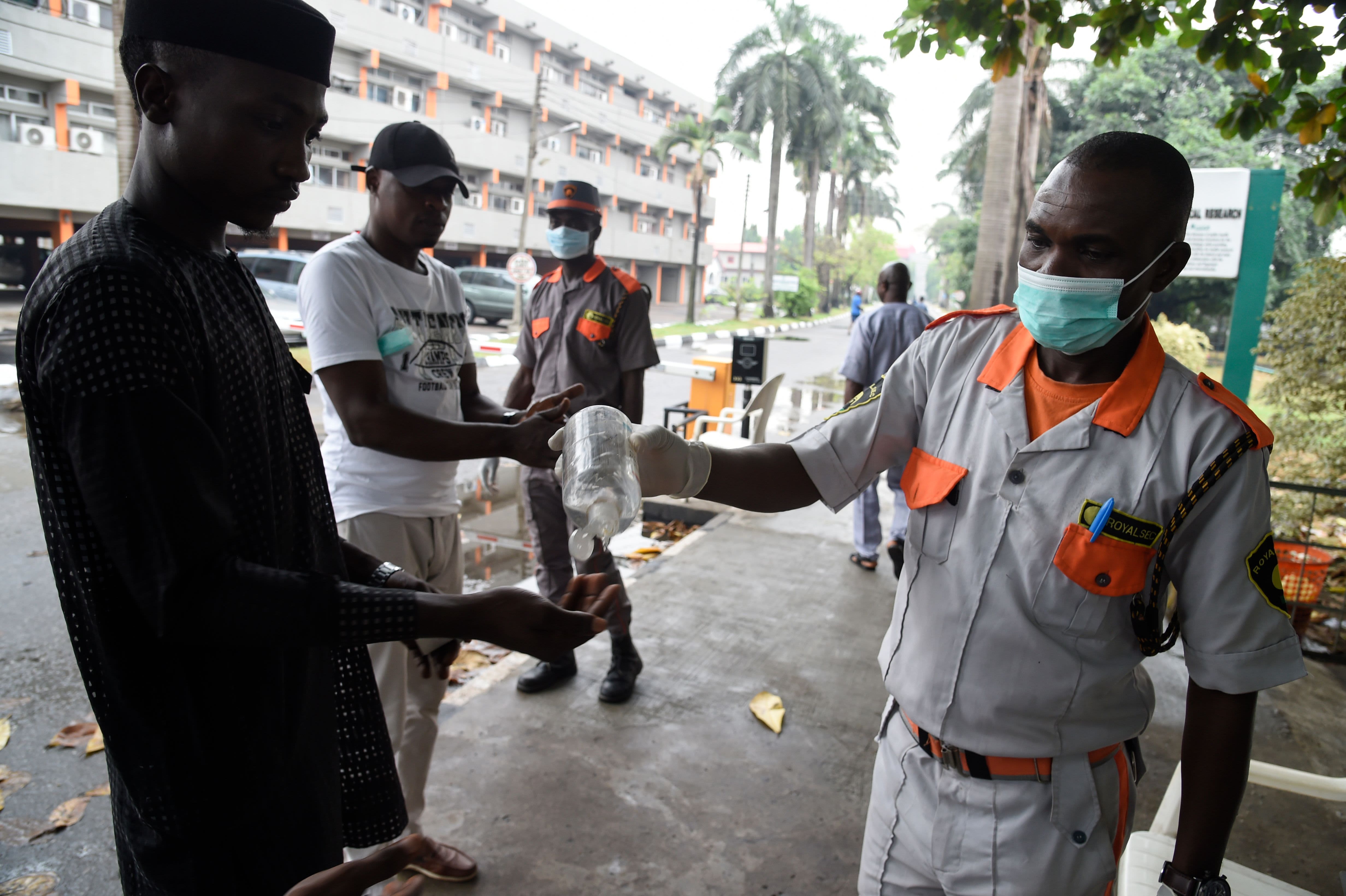
A security man administers sanitiser to a visitor to a state hospital in Lagos, on February 28, 2020.
PIUS UTOMI EKPEI | AFP via Getty Images
As of Thursday morning, there were around 6,400 confirmed cases of the coronavirus in the whole of Africa, and governments across the continent are implementing robust measures in an effort to get out ahead of the pandemic.
However, experts are calling for a more coordinated continental response in order to avoid a profoundly damaging outbreak of the kind sweeping through Europe and the U.S. in recent weeks.
In cooperation with the African Union Commission (AUC) and the WHO, the Africa Centers for Disease Control and Prevention (Africa CDC) established the Africa Taskforce for Coronavirus (AFCOR) as early as February 5, before the continent had reported a single case.
The World Bank and the International Monetary Fund (IMF) have this week called for debt relief for IDA (International Development Association) countries, including 39 African nations, in order to enable them to focus on “fighting the pandemic and its economic and social consequences.”
National responses
On Monday, Nigeria, Africa’s largest economy, announced 14-day lockdowns of the states of Lagos, Abuja and Ogun and has deployed a 15 billion naira ($38.5 million) relief package to help mobilize public services to prevent the spread in areas with poor living conditions. As of Thursday morning, there were 174 confirmed cases in the country, according to data from Johns Hopkins University.
Ghana’s two most populous cities, Accra and Kumasi, also went into lockdown on Monday, while some form of restriction to movement or dusk-till-dawn curfew is in place in almost every country in the subcontinent. Ghana has confirmed 195 cases so far.
Just a day after recording its first three cases, Botswana announced a state of emergency and a lockdown of 28 days, starting at midnight on Thursday.
The small landlocked state of Lesotho, an enclave within South Africa, on Monday implemented a nationwide lockdown despite having zero reported cases so far. The only other states yet to confirm cases are South Sudan, Comoros, Malawi and Sao Tomé & Principe, though experts have suggested that a lack of reporting capacity could be a factor here.
NAIROBI, KENYA – 2020/03/18: Commuters make their way into the Nairobi Train Station as a security personnel stands on guard while wearing a face mask as a preventive measure against COVID-19. Kenya has so far recorded seven case of Coronavirus.
Dennis Sigwe/SOPA Images
South Africa remains by far the hardest hit, reporting more than 1,300 cases. The country is already under a three-week nationwide lockdown, but President Cyril Ramaphosa on Monday announced the deployment of 10,000 field workers to conduct door-to-door screening and contact tracing.
However, Burundi and Sierra Leone both announced their first cases on Tuesday but have yet to deploy strict lockdown measures. Although restrictions are in place to control an inflow of people and cargo into Burundi, sporting events have continued unabated in the tiny Central African state. Meanwhile Tanzanian President John Magufuli has come under fire for refusing to shut down places of worship.
In many cases, lockdowns are being enforced by armed police and military personnel, which has led to instances of police brutality. On Tuesday, a 13-year-old boy was reportedly shot and killed by Kenyan police in the Mathare area of Nairobi. Videos have circulated this week of abuses of civilians by the South African National Defence Force, and police in Uganda have been accused of using their new powers to target LGBTQ people.
Coordinated governance
The strength and speed of measures deployed by most African governments reflects concern about the potential damage the virus could inflict if allowed to proliferate in high-density urban areas.
While demography is on the side of the subcontinent, with a median age of less than 20 and only 3% of the population aged 65 and above, nearly 43.0% of Africa’s population live in densely-packed urban areas, including in mega cities such as Lagos, where resources are already scarce or overburdened, and social distancing is not as readily attainable.
WHO Director-General Tedros Adhanom Ghebreyesus cautioned on Tuesday that the “developing world” will likely be hit hardest by the pandemic unless it can successfully contain the spread early on.
“At this critical moment in history, broad agreement on debt relief will be key to allowing nations with fragile health systems & economies to channel their resources into saving lives,” Ghebreyesus, who is from Ethiopia, said in a tweet.
Sub-Saharan Africa undoubtedly learned from the Ebola outbreak in 2014 and subsequently formed the Africa CDC, while many nations established National Public Health Institutes. However, the region averaged around 2.1 physicians per 10,000 people between 2010 and 2018, the lowest in the world by some distance, according to WHO data aggregated by the Mo Ibrahim Foundation (MIF).
The MIF on Tuesday launched a report calling for coordinated governance, improved health structures and better data across the African subcontinent to mitigate this crisis.
Commuters wearing a protective face masks walk on the street of Lagos, as a preventive measure against the spread of the new corona virus, COVIC-19, in Lagos, on March 26, 2020.
NurPhoto
“Sound and coordinated governance is needed across the continent,” the organization, founded by Sudanese-British businessman Mo Ibrahim, said in the research paper.
“Any pandemic requires by nature a general coordination of efforts across national and regional borders, and with multilateral actors and partners, even more so in a globalized world.”
But the report also addressed what the MIF termed the “elephant in the room” of a lack of data coverage across the continent.
“The lack of statistical capacity thus represents a major obstacle to obtaining quality health data in Africa, consequently making the production of evidence-based policy and responses to health challenges more difficult,” it said.


